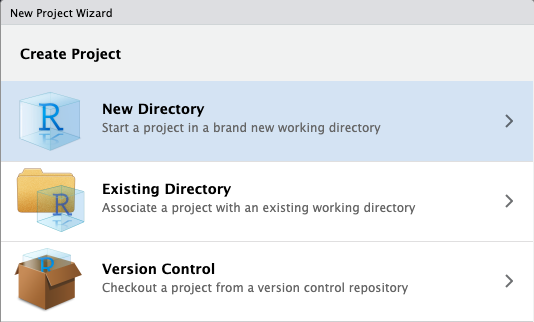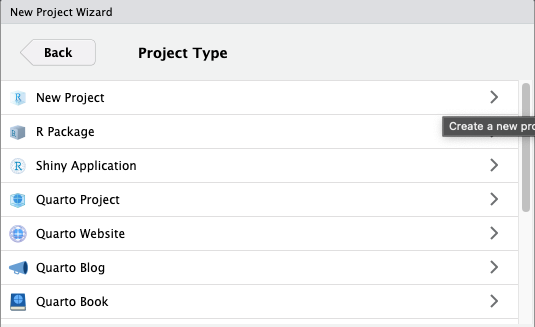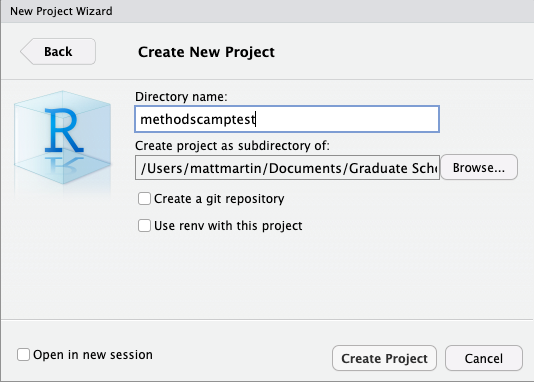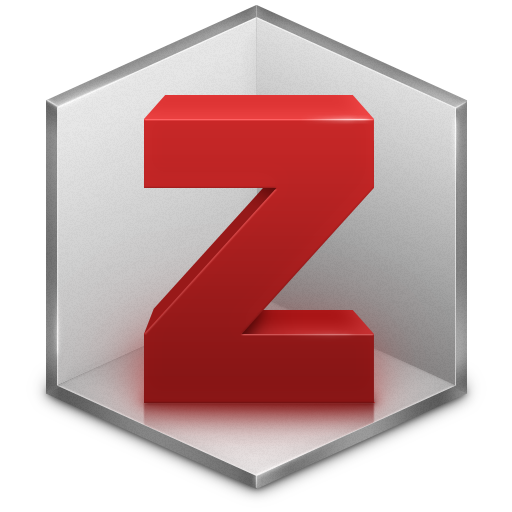getwd()9 Wrap-up
9.1 Project management
9.1.1 RStudio projects
RStudio projects are an excellent way to keep all the files associated with a project (data, R scripts, results, figures, etc.) in one place on your computer.
This is one of the best ways to improve your workflow in RStudio, allowing you to:
- Create a project for each paper or data analysis project.
- Store data files in one place.
- Save, edit, and run scripts.
- Keep outputs such as plots and cleaned data.
To create a new project file, click
File > New Project, then:


Call your project some version of “methodscamptest” and choose carefully where you wish to store the project on your machine.
If you don’t store your project (and your other files, too!) somewhere reasonable, it will be hard to find it in the future! We recommend creating a clear organizational scheme for yourself early on.
9.1.1.1 Using RStudio projects
When using an RStudio project, you should see its name in the top-right corner of RStudio, next to a light blue icon. You can check with R the folder in which your project operates:
- Now, as an example, let’s run the following commands in the script editor and save the files into the project directory.
library(tidyverse)
my_plot <- ggplot(mtcars, aes(wt, mpg)) +
geom_point()
ggsave(plot = my_plot,
filename = "plot_mtcars.pdf")
write_csv(mtcars, "mtcars.csv")Quit RStudio and check out the folder associated with the project.
You should see the PDF file for the plot, the .csv file for the data, and the
.Rprojfile for the project itself.Double-click the
.Rprojfile to reopen the project and pick up where you left off! Everything you need should be ready to go.
9.2 Other software resources
9.2.1 Overleaf

Overleaf is a collaborative cloud-based LaTeX editor designed for writing, editing, and publishing documents.
- LaTeX is a software used for typesetting technical documents. It is used widely in our discipline for the preparation for manuscripts to journals and other publishing venues.
UT Austin actually provides free access to Overleaf Professional to all graduate students using your UT email.
Create an Overleaf Professional account using your UT email address. You can do so here.
Overleaf Professional upgrades include:
- Real-time collaboration
- Real-time track changes and visible collaborator cursor(s)
- Real-time PDF preview of your document while editing and writing
- Full history view of your documents
- Two-way sync with Dropbox and GitHub
- Reference manager sync and advanced reference search.
- UT Austin resource portal, including UT Austin templates, FAQs, and resource links
LaTeX is actually the markup language that the math in Quarto and this website! If you are curious about general syntax and commands, you can access our repository at any time to get a closer look.
9.2.2 Zotero

Zotero is an open-source reference manager used to store, manage, and cite bibliographic references, such as books and articles.
When it is time to write, you can insert your sources directly into your paper as in-text citations via a word processor plugin, which generates a bibliography in your style of choice.
- This can save a lot of time, especially when you have to change citation styles for submission to another journal.
You can download the software for free here.
- You can also find a guide on how to install it here.
Zotero is one of many other reference managers out there. Alternatives include Mendeley and EndNote, among others. You should choose whatever option best suits your needs.
9.2.2.1 Benefits of Zotero
If you have not yet chosen a reference manager or are considering switching, below are some advantages of Zotero:
- Works as a standalone desktop software with plugins for Chrome, Safari, and Firefox
- Full compatibility with Google Docs
- Free plugin for Word and LibreOffice included
- Includes most popular citation styles with more styles available on the Zotero Style Repository
- Drag and drop PDF files into the library, extracting metadata such as authors, year, etc.
- Allows advanced searches of all content in your library using full-text PDF indexing
- Use cloud storage (optional) and sync libraries across devices
- Create unlimited private or public groups and collaborate by sharing files and citations
- 300MB of free cloud storage and 2GB of storage for $20 USD/year (equal to $1.67 per month)
Here is a comprehensive guide to unlocking all of Zotero’s potential.
9.3 Methods at UT
9.3.1 Required methods courses
Scope and Methods of Political Science
Statistics I (Statistics/linear regression)
Statistics II (Linear regression and more)
Statistics III (Maximum likelihood estimation)
- Only required if your major field is methods
9.3.2 Other methods courses
Statistics / Econometrics / Machine Learning:
- Causal Inference
- Bayesian Statistics
- Math Methods for Political Analysis
- Time Series and Panel Data
- Panel and Multilevel Analysis
- Network Analysis
- Machine Learning in Political Science
- Making Big Data
Formal Theory
- Intro to Formal Political Analysis
- Formal Political Analysis II
- Formal Theories of International Relations
Everything else
- Conceptualization and Measurement
- Experimental Methods in Political Science
- Qualitative Methods
- Seminar in Field Experiments
9.3.3 Other departments at UT
You can also take courses through the Economics, Business (IROM), Sociology, Mathematics, or Statistics (SDS) departments.
Software and Topic Short Courses at SDS (see their Events page): R, Python, Stata, etc.
9.3.4 Other resources
Summer programs at UT:
- Short courses in statistics (department sometimes offers scholarships to cover part of the cost)
Summer programs outside UT: